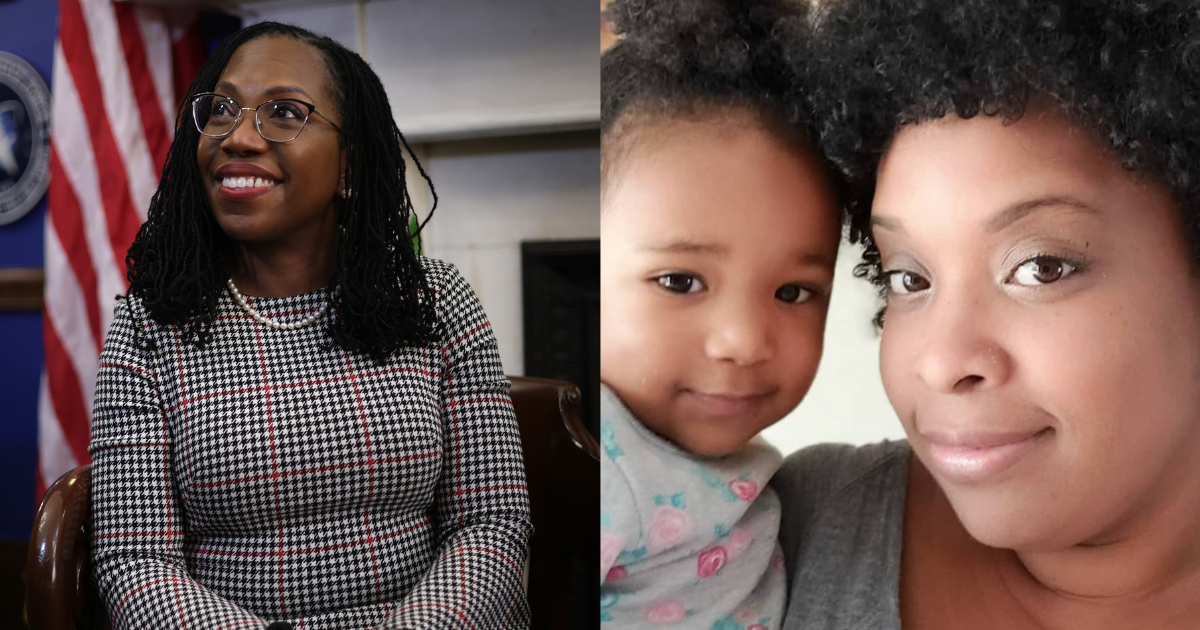
Earlier this year, President Joe Biden issued an unprecedented announcement: A Black woman may become the next appointee to the US Supreme Court, naming attorney and jurist Ketanji Brown Jackson as the front-runner for the position. And with that announcement came disappointing but expected vitriol that every professional Black woman has heard before when we show up in spaces that were never intended for us to be in — calling her appointment an affirmative action hire, as though she is not one the most qualified people to sit on the Supreme Court in its 200 year history. And that is why Justice Jackson’s appointment to the Supreme Court is so important. That is why representation matters.
As a single mom to a Black daughter, my job is to show her that the ceiling doesn’t exist, that the societal rules created to keep her small, are fake, and to instill a sense of love, confidence, and pride so deep inside her that this world won’t be able to snatch it away. Because if I don’t, she’ll internalize all the negative messages about Black girls and women swirling around her, many of which are rooted in misogynoir, as in the anti-Black racist misogyny that Black women experience.
This is why Justice Ketanji Jackson Brown's appointment to the Supreme Court will inspire young Black girls for generations to come.
A Black woman, especially a darker-skinned Black woman. Especially a darker-skinned Black woman with a strong “unprofessional” name. Especially a darker-skinned Black woman with a strong “unprofessional” name who proudly wears her natural hair in locs. Especially a darker-skinned Black woman with a strong “unprofessional” name, who wears her natural hair in locs, and is bursting the seams of the box society tries to stuff her in.
When a woman like this is appointed to the highest court in the country, the cracks in a foundation built on dehumanization, genocide, and enslavement show. And it sends a strong message to little Black girls to never let people whose ideas of you are rooted in your oppression to tell you who you are.
Like the saying goes, “they tried to bury us, they didn’t know we were seeds.”
Here’s a little history lesson for you …
Black women have only been able to vote since 1920. That’s just 102 years ago (for reference Betty White died at 99 years old last year). Only 157 years ago, Black women were considered 3/5ths of a human being as an enslaved person. But what’s most powerful about the appointment of Judge Ketanji Brown Jackson is just 165 years ago, on March 6, 1857, in the case of Dred Scott v. Sandford, the US Supreme Court, led by Chief Justice Roger B. Taney, declared that all Blacks — slaves as well as free — were not and could never become citizens of the United States. Justice Taney wrote this about Black people in his decision:
“They had for more than a century before been regarded as beings of an inferior order, and altogether unfit to associate with the white race, either in social or political relations; and so far inferior, that they had no rights which the white man was bound to respect; and that the negro might justly and lawfully be reduced to slavery for his benefit.”
And now Ketanji Brown Jackson, the descendant of people legally reduced to property, deemed only fit to be enslaved by white people by the US Supreme Court, sits as a justice on that same court.
A court that has marginalized BIPOC people under the law for almost two centuries. A Black woman in the role of Supreme Court Justice will have a considerable impact on American law for generations to come. And that powerful realization is what brought the sexism and racism out in full force during the Senate confirmation hearings. Because the people who wish to conserve the past are desperate to keep the Ketanji Brown Jacksons of the world small, quiet, and powerless.
Now, as I fill my daughter’s bookcase with books that explore the imagination, creativity, resilience, and power of Black women and girls, I can add Justice Ketanji Brown Jackson alongside stories of the first Black Vice President Kamala Harris, Shirley Chisholm, the the first Black woman elected to the US Congress, and Bessie Coleman, the first Black woman to hold a pilot’s license. My daughter is growing up to see the power of one person’s lived experience and have a role model that represents the intersections of colorism, misogynoir, and racism in a country very much still rooted in those things. Which is why I get more than a little miffed when people discount the impact of representation for young Black kids, because I know this country’s history.
I know this country never intended a darker-skinned Black woman, with locs, and a name that many would deem "unprofessional" to be a Supreme Court Justice.
Seeing a woman who looks like Justice Ketanji Brown Jackson helps shape what little Black girls imagine to be possible. Simply put, kids determine what they can be based on the examples around them. Representation matters! What our children, especially marginalized children, see (or don’t see) around them positively or negatively shapes their expectations for themselves and for each other. Let us hope, for our children’s sake, this is just the beginning, as we work to usher in a more equitable and just world. We have a long way to go, but stopping to celebrate the wins is important and necessary.
And with that, it feels appropriate to leave you with this excerpt from Maya Angelou’s famous poem, "Still I Rise" …
“Out of the huts of history’s shame
I rise
Up from a past that’s rooted in pain
I rise
I’m a black ocean, leaping and wide,
Welling and swelling I bear in the tide.
Leaving behind nights of terror and fear
I rise
Into a daybreak that’s wondrously clear
I rise
Bringing the gifts that my ancestors gave,
I am the dream and the hope of the slave.
I rise
I rise
I rise.”
Yolanda Williams is a Conscious Parenting Coach, Social Justice Instructor, and a single mom to one amazing toddler. Yolanda empowers parents with tools to be more intentional, conscious parents in order to raise the next generation of emotionally well, liberated, free-thinkers and in the process, form deeper more intentional relationships with their children. Yolanda provides coaching, DEI training for educators and many more on her website parentingdecolonized.com.




